Catalina 16.5 Centerboard (Trunk)
Sailboat specifications
The Catalina 16.5 is a 16’4” (4.98m) dinghy designed by Gerry Douglas (United States). She is built since 1994 by Catalina Yachts (United States). The Centerboard (Trunk) version grants a minimal draft when the centerboard is lifted allowing beaching and easy access to shallow areas.
The Catalina 16.5 is as well listed, on Boat-Specs.com, in Fin keel version (see all the versions compared).
The Catalina 16.5 is as well listed, on Boat-Specs.com, in Fin keel version (see all the versions compared).
Catalina 16.5's main features
- Model
- Catalina 16.5
- Version
- Centerboard (Trunk)
- Hull type
- Monohull
- Category
- Dinghy
- Sailboat builder
- Sailboat designer
- Country
- United States
- Construction
- Hull and deck: GRP (glass reinforced polyester)
- First built hull
- 1994
- Last built hull
- Still in production
- Appendages
- Centerboard : daggerboard
- Helm
- Single tiller
- Rudder
- Single spade rudder
- Unsinkable
- No
- Trailerable
- Yes
- Standard public price ex. VAT (indicative only)
- N/A €
Catalina 16.5's main dimensions
- Overall length
- 17’ 2”5.23 m
- Hull length
- 16’ 4”4.98 m
- Beam (width)
- 7’2.13 m
- Draft
- 4’ 5”1.35 m
- Draft when appendages up
- 0’ 5”0.13 m
- Mast height from DWL
- 22’ 10”6.96 m
- Light displacement (MLC)
- 430 lb195 kg
- Ballast weight
- 249 lb113 kg
Catalina 16.5's rig and sails
- Upwind sail area
- 150 ft²13.9 m²
- Rigging type
- Sloop Marconi 7/8
- Mast configuration
- Deck stepped mast
- Rotating spars
- No
- Number of levels of spreaders
- 1
- Spreaders angle
- Swept-back
- Spars construction
- Aluminum spars
Catalina 16.5's performances
- Upwind sail area to displacementiThe ratio sail area to displacement is obtained by dividing the sail area by the boat's displaced volume to the power two-thirds.
The ratio sail area to displacement can be used to compare the relative sail plan of different sailboats no matter what their size.
Upwind: under 18 the ratio indicates a cruise oriented sailboat with limited performances especially in light wind, while over 25 it indicates a fast sailboat. - 445 ft²/T41.34 m²/T
- Ballast ratioiThe Ballast ratio is an indicator of stability; it is obtained by dividing the boat's displacement by the mass of the ballast. Since the stability depends also of the hull shapes and the position of the center of gravity, only the boats with similar ballast arrangements and hull shapes should be compared.
The higher the ballast ratio is, the greater is the stability. - 58 %
Catalina 16.5's auxiliary engine
- Engine(s)
- No engine
Catalina 16.5's accommodations and layout
- Cockpit
- Closed aft cockpit
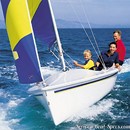

Catalina Yachts Catalina 16.5 - - 1/5
Picture extracted from the commercial documentation © Catalina Yachts
Picture extracted from the commercial documentation © Catalina Yachts
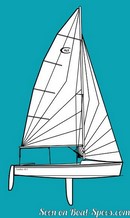

Catalina Yachts Catalina 16.5 sailplan - - 2/5
Picture extracted from the commercial documentation © Catalina Yachts
Picture extracted from the commercial documentation © Catalina Yachts
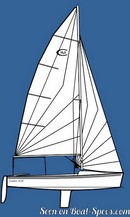

Catalina Yachts Catalina 16.5 sailplan - - 3/5
Picture extracted from the commercial documentation © Catalina Yachts
Picture extracted from the commercial documentation © Catalina Yachts
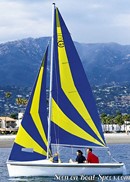

Catalina Yachts Catalina 16.5 sailing - - 4/5
Picture extracted from the commercial documentation © Catalina Yachts
Picture extracted from the commercial documentation © Catalina Yachts
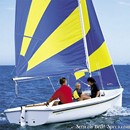

Catalina Yachts Catalina 16.5 sailing - - 5/5
Picture extracted from the commercial documentation © Catalina Yachts
Picture extracted from the commercial documentation © Catalina Yachts
Similar sailboats that may interest you:
Sailboats
First built hull
Hull length
2014
13’ 1”4 m
2008
11’ 7”3.53 m
1995
11’ 6”3.5 m
1998
14’ 7”4.44 m
1997
12’ 10”3.89 m
1997
14’ 2”4.32 m
1983
14’ 2”4.32 m
1994
16’ 4”4.98 m
2008
14’ 6”4.42 m
2003
14’ 6”4.42 m
2010
16’ 4”4.98 m
1995
15’ 2”4.64 m
2018
19’ 8”5.99 m
2016
11’ 2”3.4 m
1999
17’5.18 m